Top 10 Tools to Help You Rank in ChatGPT and other platforms in 2026
The best tools to help you rank in ChatGPT and other platforms give you data traditional SEO solutions can’t provide. Top platforms include Superlines, Profound, Scrunch and PeecAI, each offering unique ways to track, compare, and improve AI Search visibility. As GEO analytics mature, the gap between early adopters and laggards is widening fast.
Traditional search traffic is declining, while AI-driven search is becoming the new gateway to discovery. Early adopters now report that 32% of their sales-qualified leads come from generative AI search, compared to virtually none just a few months ago. The shift is no longer theoretical, it is already reshaping how users find information and how brands are discovered.
ChatGPT became the fastest-growing app in history to reach 100 million users. By February 2025, it had surpassed 400 million weekly users, doubling to 800 million by March. At the same time, Google’s AI Overviews now appear in 13% of all U.S. desktop searches, up from 6.5% in January. These numbers show that AI-driven search is no longer on the sidelines—it is taking center stage. Gartner predicts that by 2028 organic search traffic will drop by 50% as generative engines like ChatGPT and Gemini take over. Semrush forecasts a similar outcome, projecting that LLM-driven traffic will surpass traditional Google search by 2028. The implication is clear: visibility in AI search will soon matter as much as, or more than, Google rankings.
Generative Engine Optimization (GEO) tools represent the next evolution of search marketing. They allow brands to track, analyze, and improve how they appear across AI-powered engines such as ChatGPT, Google AI Overviews, Perplexity, Claude, and Gemini. Unlike SEO tools that focus on keywords and backlinks, GEO analytics reveal how AI systems interpret, summarize, and cite your content when generating answers.
In short, GEO tools bridge the gap between traditional visibility and the new world of AI-driven discovery. This guide reviews the leading GEO tools of 2026 to help you rank in ChatGPT. breaks down their features, pricing, and limitations to help you choose the right solution for your business.
What are GEO Tools and Why Do They Matter?
GEO tools measure how AI platforms like ChatGPT, Gemini, and Perplexity read, interpret, and reference your content, showing how visible your brand is inside AI-generated answers, not just on search result pages.
Before reviewing the leading tools, it helps to understand what GEO analytics actually measure and why they’re becoming essential for marketers.
Generative Engine Optimization (GEO) focuses on structuring, formatting, and enhancing digital content so it gets picked up, summarized, or cited by AI-powered search engines and large language models. Unlike traditional SEO, which is about ranking web pages for specific keywords, GEO analytics measure how often and how accurately AI assistants use your information when responding to user prompts.
Traditional search engines list ranked results. AI search platforms create conversational answers that combine data from multiple trusted sources. This shift introduces a new set of success metrics: visibility, citation frequency, and contextual accuracy, all of which matter more than ranking positions.
Most importantly, GEO analytics make your actions measurable. They show the direct impact of your optimizations, helping you identify which improvements increase AI visibility and accelerate brand recognition inside generative search.
In short, GEO analytics tell you what traditional SEO cannot: whether AI systems actually understand, trust, and promote your brand when people ask questions in generative search.
Why tools that use only APIs can miss real AI answers
One of the biggest technical differences between Promptwatch alternatives is how they collect answer data. Some tools rely only on model APIs, while others capture the real answers that users actually see in the UI. This matters a lot for Brand Visibility and Citation Rate.
The New Success Metrics That Actually Matter:
Traditional SEO focused on rankings, clicks, and backlinks. GEO success requires tracking entirely different metrics:
- Brand Visibility: The percentage of AI responses that mention your brand.
- Brand Mention Rate: How often LLMs mention any brand in the prompts you track.
- Brand Share of Voice: Your share of total brand mentions within the prompts you track.
- Citation Rate: How often LLMs cite your website as a source, including linked or referenced content.
- Sentiment Distribution: The tone and context of brand mentions (positive, neutral, or negative), though most are typically positive or neutral.
- Competitive Positioning: How your brand ranks and is represented compared to competitors in AI responses.
What Are the Best Tools to Rank in ChatGPT and Other AI Search Platforms?
There is no single best tool for every team. The right choice depends on budget, implementation appetite, and how deeply you want to integrate AI visibility into your analytics stack.
1. Superlines
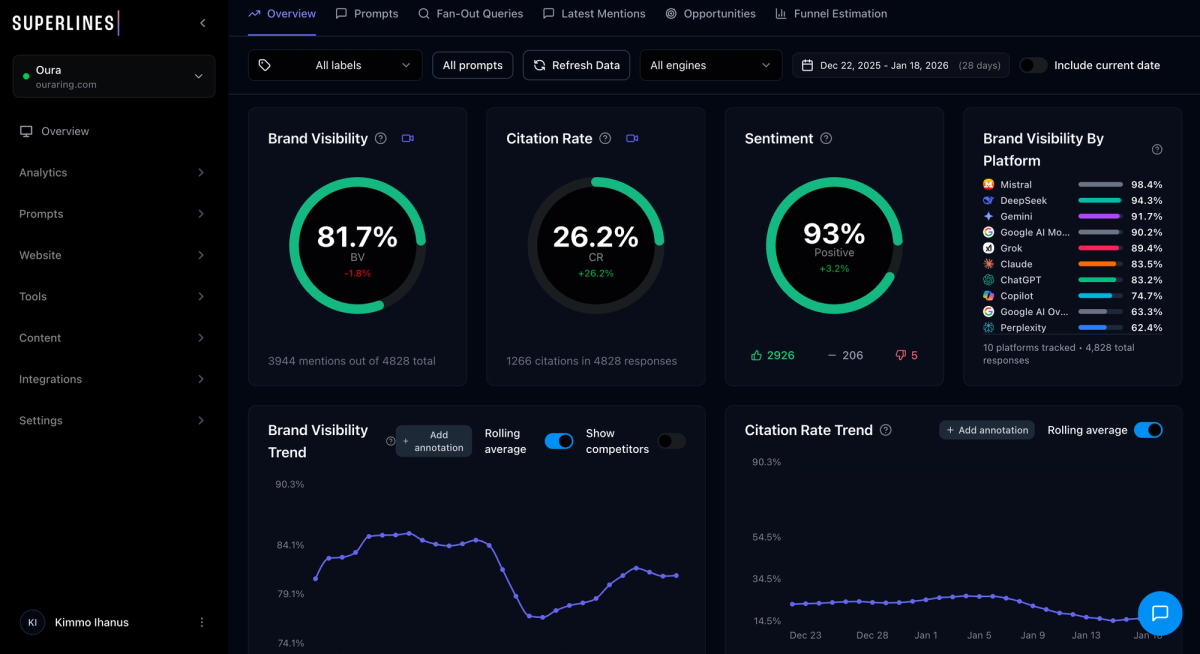
Superlines is a Generative Engine Optimization (GEO) platform that helps marketing teams and agencies see how often AI engines mention and cite their brand, then turns that visibility data into clear opportunities instead of static dashboards. It uses real answer data from live AI interfaces across 10 major AI engines and exposes the same structured dataset through the in app Superlines Agent and an MCP server, so teams can work with the data inside their own AI assistants and agents when they want to surface insights and take action.
Key features
- Cross platform AI visibility tracking: Track brand visibility and competitive share of voice across 10 major AI engines, including ChatGPT, Perplexity, Claude, Microsoft Copilot, Google AI Mode, Google AI Overviews, Gemini, Mistral, DeepSeek and Grok.
- Citation and competitor gap analysis: See which pages are cited, where competitors win citations instead of you, and which third party articles or UGC threads (for example Reddit, Quora) are worth pursuing for additional mentions.
- AI Traffic and AI Bot Analytics: Monitor how AI crawlers from OpenAI, Anthropic, Google, Perplexity and others actually visit your site, which pages they read, and how that traffic connects to human visits at prompt and URL level.
- Automated prompt management and Search Query Fan-Out insights: Superlines helps you discover, test and clean up prompts, and surfaces the Search Query Fan-Outs (LLM keywords) that AI assistants run behind the scenes so you see which topics, queries and sources drive your AI visibility.
- Built for multi brand, multi market workflows: Unlimited brands and domains per workspace, with market specific languages and competitors. Designed for agencies and in house teams that manage several services and regions in one view.
- Surface insights with interactive agents: Access the full visibility dataset through the in app Superlines Agent or via the MCP server, so your own AI assistants can analyze results, suggest next steps, and support day to day GEO workflows.
Pricing
- Starter plans from €89 per month, including 1 AI engine of your choice, 75 tracked prompts, AI Traffic plus AI Bot analytics, and MCP access.
- Higher tiers add more engines, prompts, data retention and advanced tools like large scale crawling and content support.
Limitations
- Tiered Feature Access: Advanced tools like full historical data are reserved for Enterprise and Agency partnership plans.
- Data Limits: Entry-level plans have more restrictive data retention and prompt volumes.
2. Profound
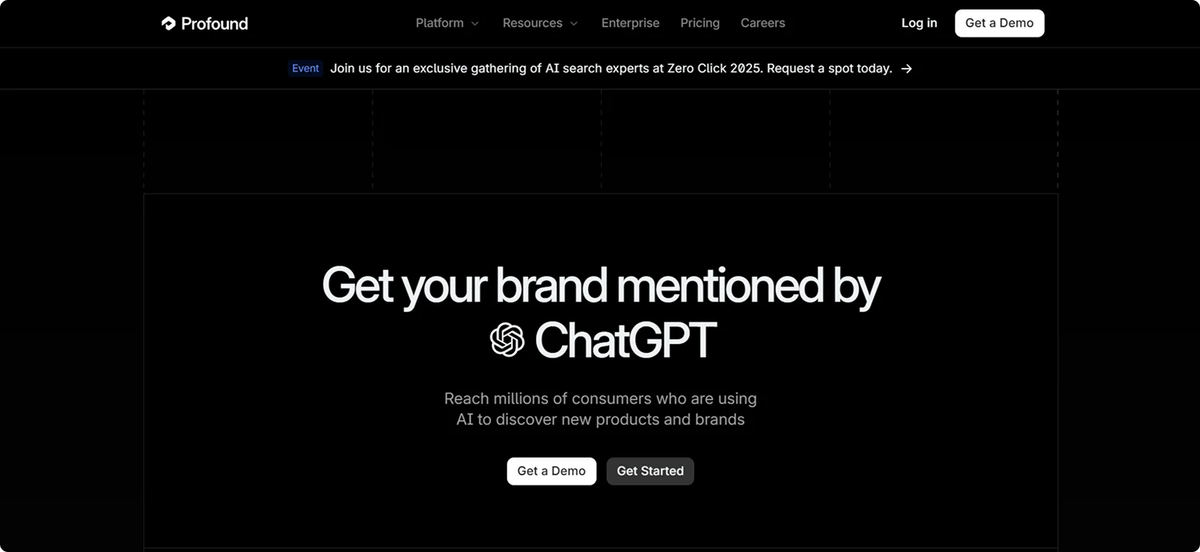
Profound has evolved from a promising GEO platform to a market-defining company pioneering the concept of "marketing to Superintelligence." Its $35M Series B funding (right after their $20M Series A in June of 2025), led by Sequoia Capital, positions it as the definitive solution for organizations serious about preparing for an AI-first marketing future.
Key Features:
- Answer Engine Insights: Comprehensive brand visibility tracking across ChatGPT, Perplexity, Gemini, and other major AI platforms.
- AI Crawler Analytics: Agent Analytics reveals how AI crawlers access your content, provides a technical analysis to ensure your site is optimized for AI indexing, and uses a GA4 integration to attribute traffic and conversions to AI search.
- Shopping Intelligence: Shopping Insights shows your products' visibility in ChatGPT identifies keywords to target, analyzes competing products and retailers, and helps you refine how your products are represented.
- Conversation Explorer: Live monitoring of trending topics and user query patterns across AI platforms.
- Content Workflows: Automated content creation and optimization pipelines for AI visibility.
Pricing: Starting at $89/month for the Standard plan, with custom enterprise pricing available.
Limitations:
- Many advanced features, such as Agent Analytics, Shopping Insights and full multi engine coverage, are locked to higher tier plans.
- As a bigger, enterprise focused platform, it usually requires more setup and is slower to adapt than some of the newer GEO solutions.
- Public information about the external datasets they “buy” to power their platform is limited, so teams that need full data lineage and methodology transparency will have to ask detailed questions during procurement.
If you’re comparing enterprise GEO solutions, check out our Best Profound Alternatives 2026 guide for a full breakdown of competing platforms.
3. Peec AI
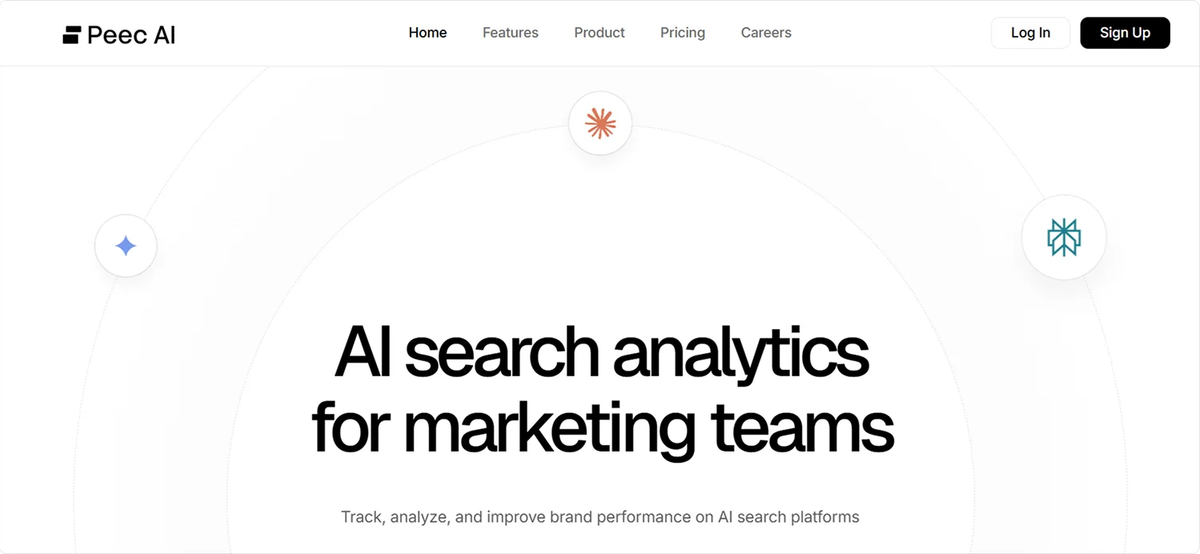
Peec AI offers comprehensive multi-platform monitoring with a focus on real-time alerting and competitive benchmarking across AI search engines.
Key Features:
- Real-Time Alerts: Instant notifications when brand visibility changes for specific prompts
- Multi-Platform Coverage: Tracking across ChatGPT, Perplexity, Gemini, and emerging AI platforms
- Source Attribution Analysis: Understanding which websites influence AI responses about your brand
- Regional Tracking: Geographic-specific monitoring for international brands
Pricing: Basic: €89/month (25 prompts), Plus: €199/month (100 prompts), Business: €499/month (300+ prompts)
Limitations
- Limited optimization recommendations compared to competitors. Higher pricing for advanced features.
- Relies on API output instead of capturing real answers from AI interfaces.
4. Scrunch AI
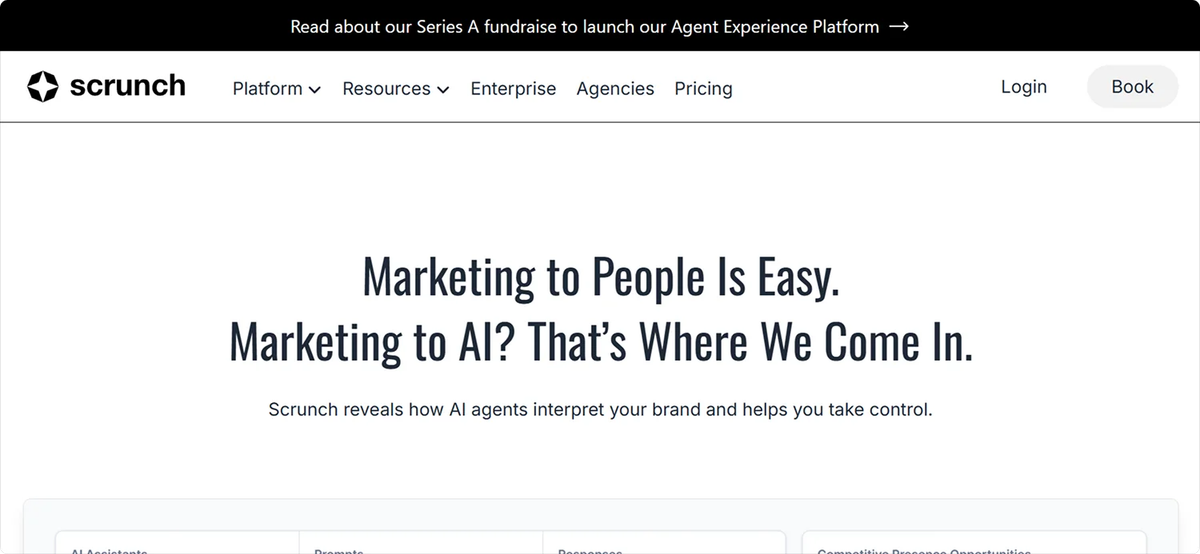
Scrunch is a GEO tool that helps enterprise teams detect and correct false narratives in AI-generated answers. If you're concerned about outdated product information, competitor-biased summaries, or broken messaging, it provides the right solutions for your team.
Key Features:
- Misinformation Detection: Proactive identification of false or outdated brand information in AI responses
- Narrative Control: Tools for correcting and improving brand representation across AI platforms
- Journey Mapping: Understanding how AI agents navigate websites and interact with content
- Knowledge Hub: Library of owned and third-party content that AI engines cite
Pricing: Starter: $300/month (350 prompts), Growth: $500/month (700 prompts), Pro: $1,000/month (1,200 prompts)
Limitations:
Limitations
- Higher pricing for basic features. Limited market presence compared to established platforms.
- Relies on API output instead of capturing real answers from AI interfaces.
- In our tests with established enterprise clients, creating an AI friendly version (AXP feature) on a separate domain did not increase AI bot traffic, largely because that domain lacked authority. The idea is interesting, but so far we have not seen consistent visibility gains in real production use.
5. XFunnel
XFunnel combines AI visibility analytics with actionable playbooks and expert support. What makes this tool unique is its "Buying Journey Analysis" dashboard. This GEO analytics feature breaks down your brand's AI visibility at each stage of the funnel, from awareness to consideration to conversion.
Key Features:
- Buying Journey Analysis: Funnel-specific visibility tracking from awareness to conversion
- Query Analytics: Discovery of top AI prompts by intent, region, and persona
- Dedicated Analyst Support: Tailored recommendations and optimization playbooks
- Real-Time Visibility Tracking: Cross-platform monitoring with trend analysis
Pricing: Custom pricing with free AI search audit available.
Limitations:
- Custom pricing lacks transparency. Limited public information about platform capabilities.
- Relies on API output instead of capturing real answers from AI interfaces.
6. Otterly AI
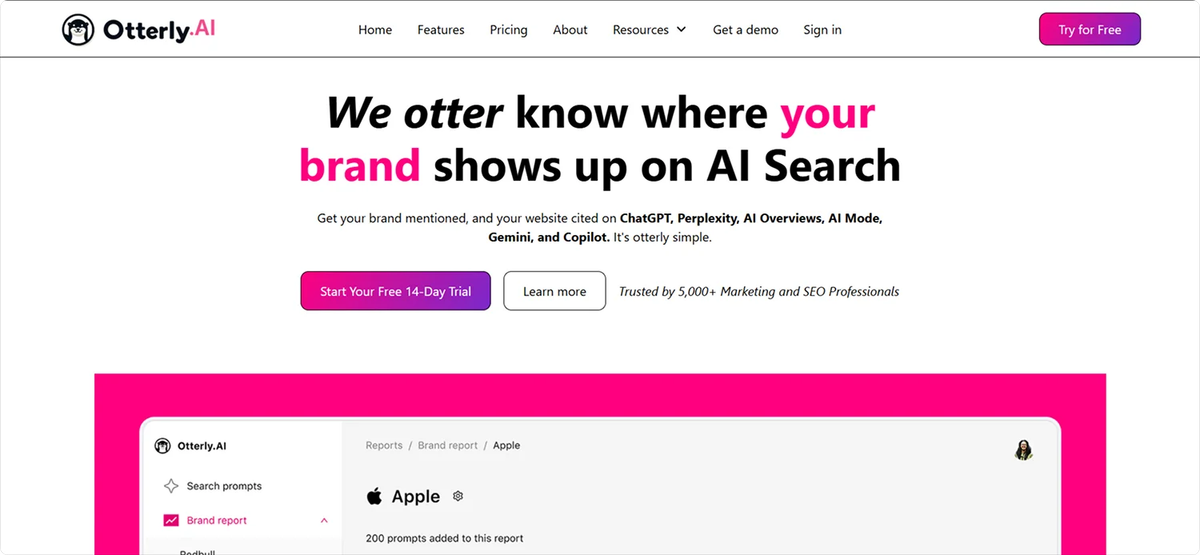
Otterly is the most practical GEO tool for teams focused on prompt-level AI rankings. It lets you monitor where your brand appears in AI-generated responses, track link citations, and discover high impact prompts your audience is using.
Key Features:
- Prompt Discovery: AI keyword research tool that transforms traditional keywords into conversation-based queries
- Automated Link Citation Detection: Real-time tracking when AI platforms reference your content with links
- Brand Visibility Index: KPI showing brand prominence across AI search engines over time
- GEO Audit: Comprehensive analysis with SWOT, competitor assessment, and tactical recommendations
Pricing: Lite: $29/month (10 prompts), Standard: $189/month (100 prompts), Pro: $989/month (1,000 prompts)
Limitations:
- Significant price jump between tiers. The leap from $29 to $189 monthly might be challenging for growing businesses. Limited advanced analytics compared to enterprise platforms.
- Relies on API output instead of capturing real answers from AI interfaces.
7. Promptwatch
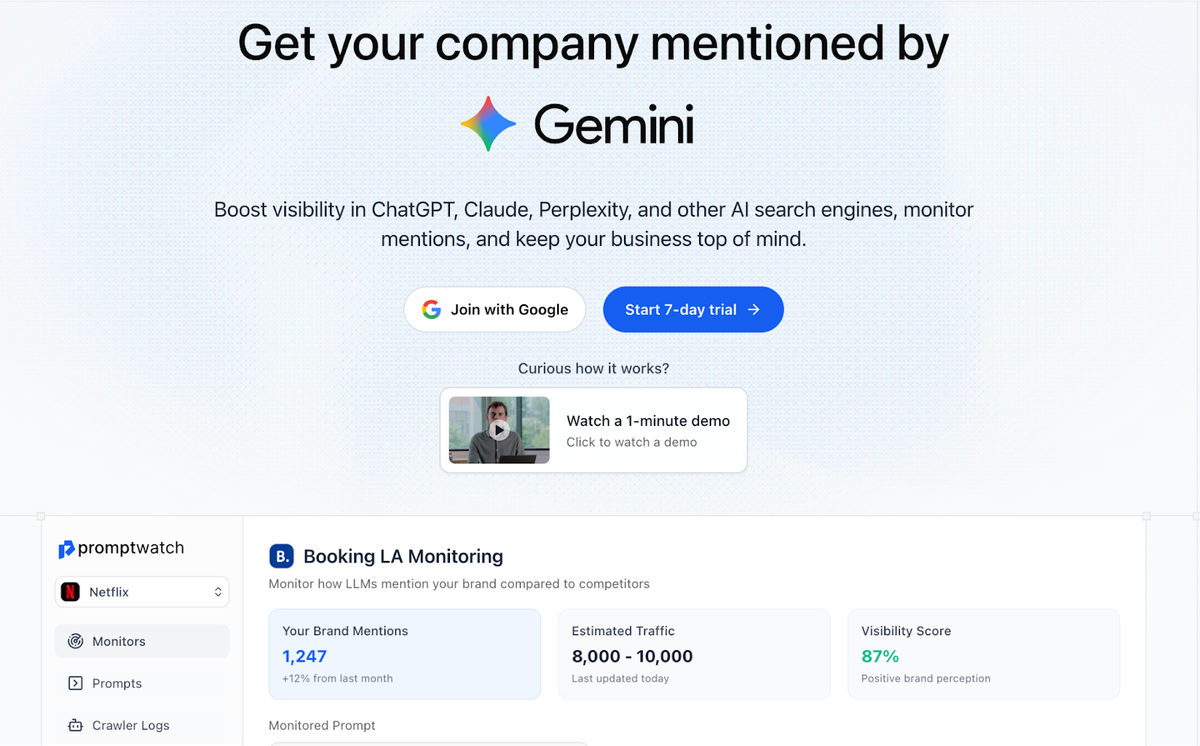
Like the name of the product says, Promptwatch tool helps you track brand mentions across AI platforms, helping companies understand how they're portrayed by AI Search engines.
Key Features:
- Prompt tracking: Track brand mentions across AI models
- AI traffic attribution: Identify which AI models drive traffic and conversions, and tie outcomes back to pages and content.
- Content optimization: Receive content optimization suggestions
- Looker studio integration: Allows you to view your data in Looker studio
Pricing: Starting from $75/a month with Professional and Business options.
Limitations: Platform itself isn’t as actionable as it could be and to get everything out of the platform you are required to have technical implementation skills and required to send server logs for them to attribute traffic.
8. SEOmonitor
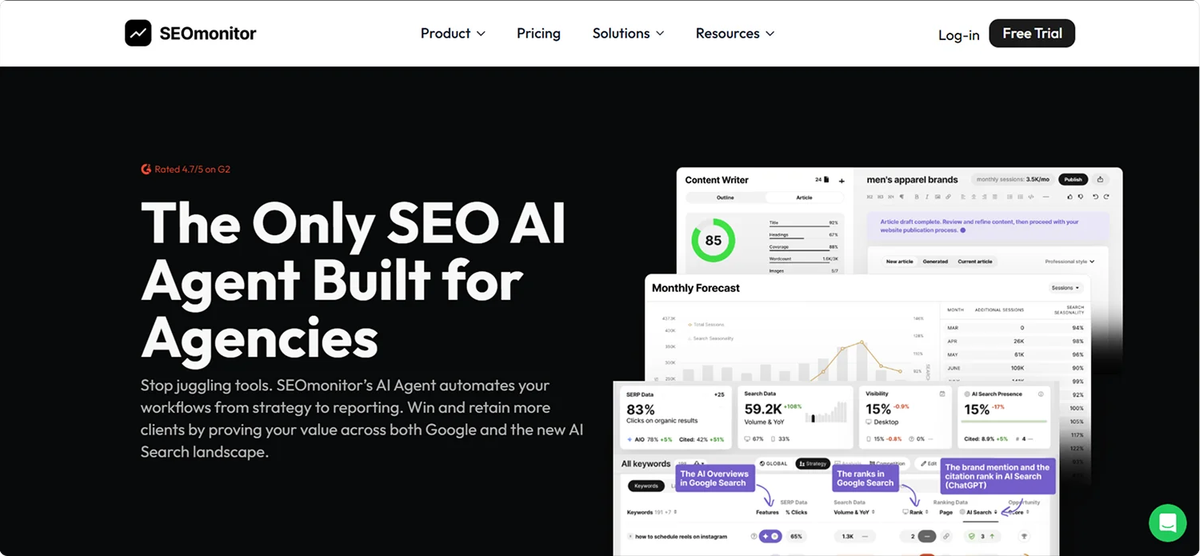
SEOmonitor is an in-depth AI Overviews and chatbot tracking tool with access to brand mentions, daily snapshots, and custom analyses. Plus, the platform allows dual-signal tracking (SEO+GEO).
Key Features:
- Response evolution tracking: You can check when and how your content gets added or left out in chatbot conversations
- Access raw data through API: This feature lets you access raw data to run large-scale reports
- Dual SEO and AI tracking capabilities
Pricing: Starter: From $116 for 1000 keywords tracked daily. Writer: $29 for 5 AI-written articles. Pro: From $339 for 3000 keywords tracked daily.
Limitations:
- Targets only agencies instead of in-house teams as well.
- Relies on API output instead of capturing real answers from AI interfaces.
9. Goodie AI
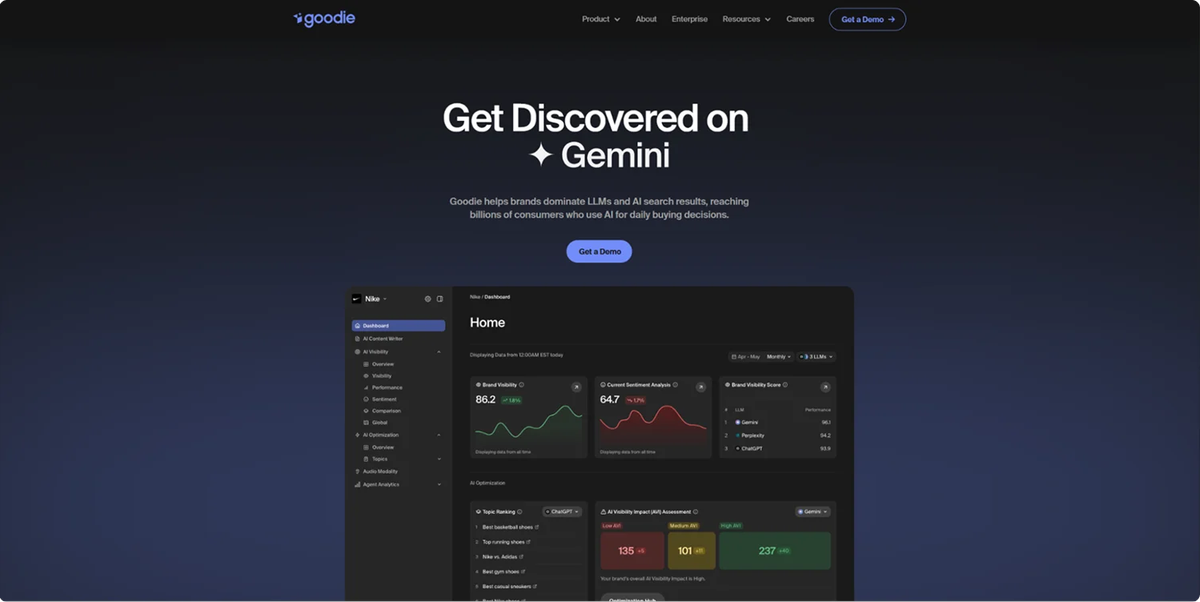
Goodie AI is offering a comprehensive answer engine optimization platform from tracking to optimization.
Key Features:
- AI-powered content creation tailored for AI search
- Comprehensive visibility tracking and analysis
- Topic research and keyword optimization
- Attribution tracking and ROI measurement
- Integration with popular content management systems
Pricing: Enterprise plans available only after a call
Limitations:
- No publicly listed starting price and the UI shots shared on their website doesn’t make the software look that actionable even if the UI does look sleek.
- Relies on API output instead of capturing real answers from AI interfaces.
10. Brandwatch
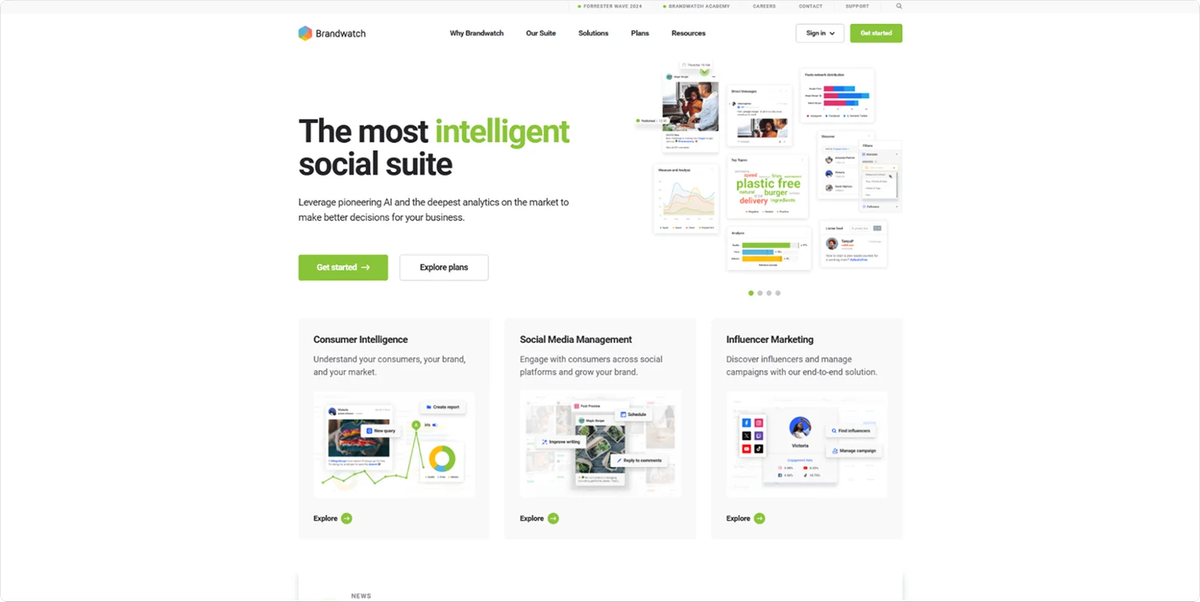
Brandwatch is a leading Consumer Intelligence and Social Media Management solution that empowers over 5,000 of the world's most admired companies to understand and engage with customers at the speed of social.
Key Features:
- Consumer intelligence across social and AI platforms
- Advanced sentiment analysis and trend identification
- Influencer marketing and community management
- Customer data management and segmentation
- Enterprise-grade security and compliance
Pricing: Custom pricing
Limitations:
- Capabilities of their AI Search intelligence due not extend to the same level as dedicated GEO solutions like Superlines or Profound, but still a strong contender as a standalone solution next to them to track brand mentions in social media and AI platforms.
- Relies on API output instead of capturing real answers from AI interfaces.
How to Use GEO Tools Like Superlines Effectively
Once you have selected a GEO platform such as Superlines, the real value begins after the first visibility report. As marketers, we do not want data for its own sake. Insights only matter when they lead to faster, better decisions. That is why Superlines has been designed as the most actionable solution in the market—built to turn analysis into measurable results, not more time spent analyzing dashboards.
Here’s how to use those insights to strengthen your visibility and performance in AI search:
1.Track your prompts daily
Monitor your core prompts every day to see which content pieces AI systems currently select as top citations. This shows what LLMs view as the most relevant and trusted answers in your category.
2.Analyze what is winning and why
For each prompt, determine whether the top-cited pages are highly optimized or ranking simply due to lack of competition.
•If a page is already strong, build a more detailed and structured version supported by fresh data and schema.
•If the ranking page is weak or outdated, you can win quickly by publishing a better optimized and more comprehensive article.
3.Adjust and measure in real time
GEO platforms like Superlines make it possible to see how every update impacts your visibility. When you refresh content or publish something new, you can measure within days whether your changes improved brand visibility and citation rate across the AI Platforms.
4.Create a continuous feedback loop
This process; analyzing, improving, and validating, creates a continuous feedback loop that accelerates learning and reduces time to action. Superlines is built to support this workflow end-to-end, helping marketers spend less time interpreting data and more time executing changes that grow their visibility and results.
Here’s a simple action plan for you to start before you have a dedicated tool
Today (30 minutes):
Find 2-3 statistics for an article that could use more authority and add them with sources
Ask ChatGPT and Perplexity one question your audience would ask about your topic, then note which competitors get cited and what language patterns the AI uses
This week:
Rewrite 3-5 key headings in one article as direct questions. Then ensure the first paragraph under each directly answers the question
Add one specific case study or example to your author bio
Test whether competitors appear when you search your topics on AI platforms. Then identify one element from the most-cited sources that you can adapt for your content
That's it. Start with these five actions before diving deeper.
Advanced GEO Strategy: Strengthen Topic Authority Through Entities
Once you’re tracking your AI visibility, identify which topics your brand gets cited for. Then, create supporting content that reinforces those entities, like glossaries, FAQs, and definitions.
Most important part is to take action
The more consistently an AI engine sees your brand associated with a topic cluster, the more likely it is to treat your content as a canonical source in future answers.
This guide will remain relevant as new AI models and search interfaces evolve; the principles of visibility, authority, and accessibility apply across all future LLM-based platforms.
The next phase of search is already here and visibility depends on how AI systems understand and cite your content. As AI systems become the primary discovery layer, visibility will shift from pages and rankings to citations and mentions. Brands that treat AI search as a measurable, optimizable channel will dominate awareness in the same way early adopters of SEO did two decades ago.
Start tracking your brand’s AI search visibility with Superlines to see where you already appear and where untapped opportunities still exist across ChatGPT, Perplexity, and Google AI Mode.
For a deeper, strategic breakdown of how to operationalize these tactics inside your marketing team, see our 10-Step GEO Guide for 2026.
The future of search belongs to brands that understand how AI sees the web. Start optimizing for visibility inside answers, not just rankings and you’ll define how your market discovers you.
